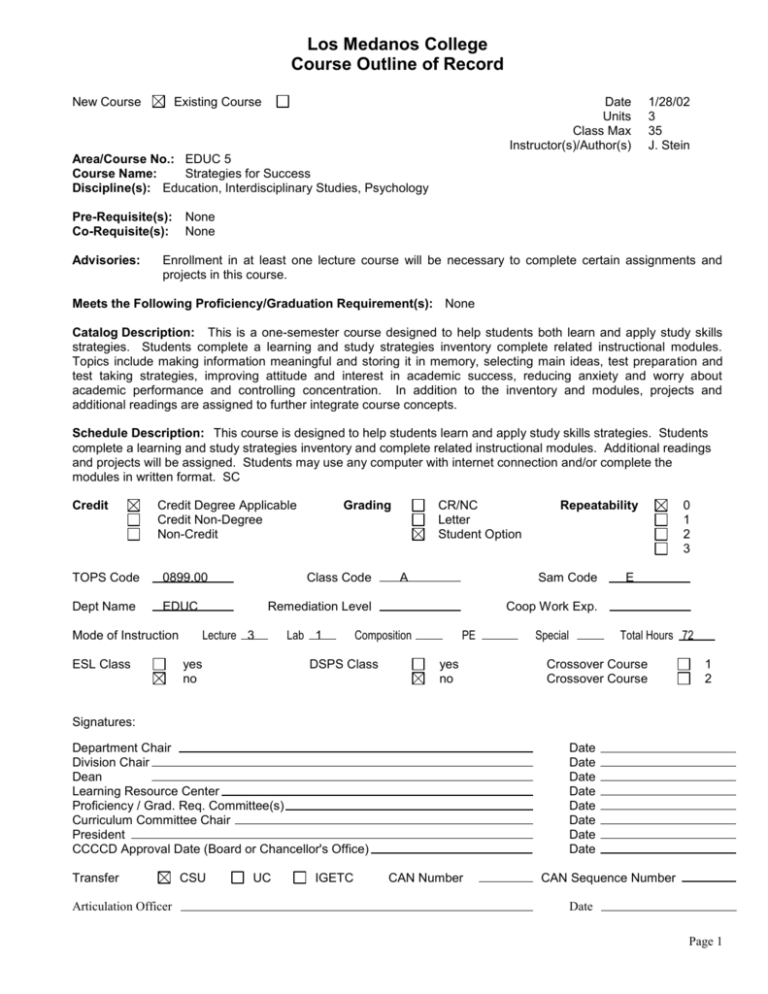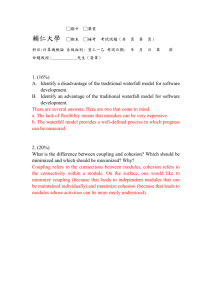Strategies for Success
advertisement

Los Medanos College Course Outline of Record New Course Existing Course Date Units Class Max Instructor(s)/Author(s) 1/28/02 3 35 J. Stein Area/Course No.: EDUC 5 Course Name: Strategies for Success Discipline(s): Education, Interdisciplinary Studies, Psychology Pre-Requisite(s): Co-Requisite(s): Advisories: None None Enrollment in at least one lecture course will be necessary to complete certain assignments and projects in this course. Meets the Following Proficiency/Graduation Requirement(s): None Catalog Description: This is a one-semester course designed to help students both learn and apply study skills strategies. Students complete a learning and study strategies inventory complete related instructional modules. Topics include making information meaningful and storing it in memory, selecting main ideas, test preparation and test taking strategies, improving attitude and interest in academic success, reducing anxiety and worry about academic performance and controlling concentration. In addition to the inventory and modules, projects and additional readings are assigned to further integrate course concepts. Schedule Description: This course is designed to help students learn and apply study skills strategies. Students complete a learning and study strategies inventory and complete related instructional modules. Additional readings and projects will be assigned. Students may use any computer with internet connection and/or complete the modules in written format. SC Credit Credit Degree Applicable Credit Non-Degree Non-Credit TOPS Code 0899.00 Dept Name EDUC Mode of Instruction ESL Class Grading Class Code CR/NC Letter Student Option A Sam Code Remediation Level Lecture 3 yes no Lab 1 0 1 2 3 E Coop Work Exp. Composition DSPS Class Repeatability PE yes no Special Total Hours 72 Crossover Course Crossover Course 1 2 Signatures: Department Chair Division Chair Dean Learning Resource Center Proficiency / Grad. Req. Committee(s) Curriculum Committee Chair President CCCCD Approval Date (Board or Chancellor's Office) Transfer Articulation Officer CSU UC IGETC Date Date Date Date Date Date Date Date CAN Number CAN Sequence Number Date Page 1 Los Medanos College 2700 E Leland Road Course Name Strategies for Success Area/Course No. EDUC 5 Pittsburg CA 94565 (925) 439-2181 Pre-Requisites: Co-Requisites: Catalog Description This is a one-semester course designed to help students both learn and apply study skills strategies. Students complete a learning and study strategies inventory complete related instructional modules. Topics include making information meaningful and storing it in memory, selecting main ideas, test preparation and test taking strategies, improving attitude and interest in academic success, reducing anxiety and worry about academic performance and controlling concentration. In addition to the inventory and modules, projects and additional readings are assigned to further integrate course concepts. Method of Evaluation/Grading Learning and Study Strategies Inventory (LASSI) and modules 30% Tests/Quizzes 15-20% Homework/Short Assignments 10-15% Projects (2) 20-30% Final Exam 10-20% Scale: 90-100% 80- 89% 70- 79% 60- 69% below 50% A B C D F Textbooks Learning and Study Strategies Inventory & Modules By Claire Ellen Weinstein, Ph.D., David R. Palmer, Ph.D. University of Texas at Austin Page 2 Los Medanos College 2700 E Leland Road Course Name Strategies for Success Area/Course No. EDUC 5 Pittsburg CA 94565 (925) 439-2181 Course Objectives The student will be able to: 1. Assess their own learning strengths, weaknesses and study strategies related to will, skill and self-regulation components of strategic learning. 2. Alter behaviors, attitudes and beliefs that relate to successful learning through educational interventions. 3. Apply educational interventions and learning strategies to other college courses. 4. Assess the integration and effectiveness of strategic learning and the course concepts. Method of Instruction Three hours lecture with one-hour lab per week. During the lab hour students will independently, along with computer software, assess their learning and study strategies and complete related instructional, web based, or written modules. Student will complete their first three modules in areas where they are weakest. The instructor will examine individual student’s learning assessment scores from the inventory and class trends will determine the greatest emphasis for additional assignments, projects, individual logs, journals, class discussion and group activities. The instructor will choose the best approach for meaningful feedback to students. Each student will take written notes on the modules and submit them to the instructor for a grade. The students will also put copies of the activities from the modules into a portfolio. Areas where a few students are weak may need individual assignments or help. Areas of general weakness need to be addressed for the whole class early in the semester. Projects will be assigned with the purpose of assessing the effectiveness of the inventory modules on student learning. Additional short assignments and homework from handouts presented in class will be based on the course topics. Page 3 Los Medanos College 2700 E Leland Road Course Name Strategies for Success Area/Course No. EDUC 5 Pittsburg CA 94565 (925) 439-2181 Course Content I. Learning and Study Strategies Inventory (LASSI) is a 10-scale assessment of student awareness that is designed to provide students and instructors with information about learning, study practices and attitudes. II. INVENTORY Module Component Scales*: Web-based and written modules that contain approximately 3-5 hours of instruction in one of the ten scales (below) assessed by the INVENTORY. a. Information Processing – assesses how well students can use imagery, verbal elaboration, organization strategies and reasoning skills as learning strategies to help build bridges between what they already know and what they are trying to learn and remember, i.e., knowledge acquisition, retention and future application. b. Selecting Main Ideas – assesses student’s skill at identifying critical information from less important details. c. Test Strategies – assesses student’s skill at identifying critical information from less important details. d. Attitude – assesses student’s attitudes and interest in college and academic success. It examines how facilitative or debilitative the approach to college and academics is for helping them get their work done and succeeding in college. e. Motivation – assesses student’s diligence, self-discipline and willingness to exert the effort necessary to successfully complete academic requirements. f. Anxiety –assesses the degree to which students worry about school and their academic performance. A low score indicates high levels of anxiety. g. Concentration – assesses student’s ability to direct and maintain attention on academic tasks. h. Time management – assesses student’s application of time management principles to academic situations. Students who score low may need to develop effective scheduling and monitoring techniques in order to assure timely completion of academic tasks and to avoid procrastination. i. Self-Testing Scale – assesses students’ use of reviewing and comprehension monitoring techniques to determine their level of understanding of the information to be learned. j. Study Aids Scale – students’ use of supports or resources to help them learn or retain information (i.e. italics, text headings, etc.) III. Handouts: Additional, relevant articles and readings compiled from various sources. *Weinstein, descriptor. Page 4 Los Medanos College 2700 E Leland Road Course Name Strategies for Success Area/Course No. EDUC 5 Pittsburg CA 94565 (925) 439-2181 Assignments I. Students will complete a learning/study skills inventory pre-semester or at the beginning of the semester. The purpose of the inventory is for students and teachers to help identify areas in which students could benefit most from educational intervention, and it can be used for planning individual prescriptions for improvement. Instructor: The instructor will orient students to the inventory and teach them how to utilize the relevant webbased or written modules. Once the students have completed the inventory, the instructor will meet individually with each student to discuss the results. The instructor will use the results of the inventory for pre/post achievement measures. The instructor will pace the students and assign due dates for specific modules (see attached example; Weinstein). The instructor will base additional class readings and activities on the results from the inventories. Students will take notes on the modules and the instructor will review them. Students will submit the notes for a grade. II. Projects (2): The projects assigned for this course are meant to assess the effectiveness of the INVENTORY modules on student learning. The instructor may choose a minimum of 2 projects from the following or additional ones that demonstrate effective student learning. a. Integrative Project – Students write a comprehensive paper that evaluates their progress on improving the weak areas indicated by the LASSI. What have they done to improve these areas over the semester (besides completing the modules) as they relate to their classes? In what ways have they improved? What areas still need work? How have they integrated the concepts taught in the modules to their life or other classes? (Sample questions). b. Teaching Project - From a list of 10 common student issues from each module, (sample: “I studied forever for the test but still didn’t do well.”) students will research and study possible solutions to the problem and prepare a 10-15 minute class presentation. This may also be a group project on a particular issue. Students from the class provide feedback to the presenter(s) as well as evaluate each team member. c. Goals Project – Students define & set particular goals for improvement pertaining to their current class schedule (sample: “I want to improve taking math tests.”) and reflect on how they went about meeting their goals (plan) and assess their feelings about the process in relation to the information from the modules. What did they do this semester? Strengths and weaknesses of the plan? (Sample questions). This assignment is highly recommended to provide the student with application of the course concepts to other areas of study. III. Short assignments and homework: Students will read selected articles based on topics for the course. These articles may form the basis for class discussion and for writing minute papers as well as small group discussion/work. Page 5






